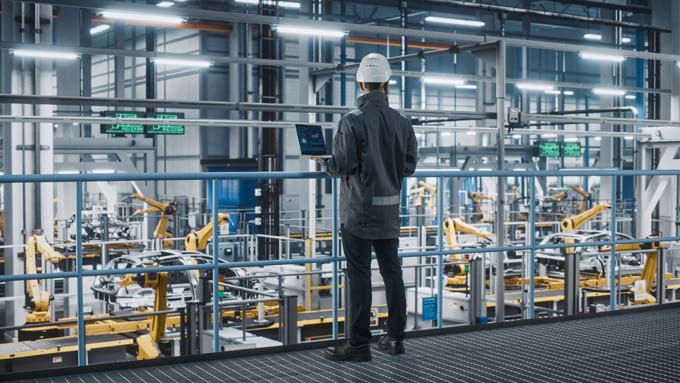Cloud technology and Swiss manufacturers: about efficiency and much more
Management pioneer Peter Drucker once said, "Efficiency is doing things right; effectiveness is doing the right things." Guest author Billy Kneubühl of Oracle Switzerland believes that every initiative must be both strategically aligned and optimized for efficiency.

Manufacturers have spent the last few years looking at their data and adopting IoT sensors, architectures and applications to better understand their processes and optimize them for efficiency. But the focus on efficiency has left some manufacturing companies unable to see the forest for the trees when it comes to digital transformation. A study by McKinsey found that 70 % of digital transformation initiatives fail to achieve their goals. However, pioneers in the industry are already looking beyond efficiency. The 2020s will be the decade when more mature, accurate approaches to digital transformation in the manufacturing sector evolve. Manufacturers will become more effective and strategically leverage cloud technology to drive better business outcomes.
Data nourish new models
In the past, a sale was seen as the end of the sales process. A customer decides to buy, receives the product, and when satisfied with it, the manufacturer's involvement is over. However, manufacturers increasingly view ongoing maintenance and other services as a profitable part of the sales process.
We are now seeing new approaches move beyond a single transactional interaction with customers and use data to merge sales and services. The result is a move to a pay-for-use model, and then to a pay-for-outcome model based on the provision of a service - for example, connectivity as a service. Based on customer usage, manufacturers can offer personalized services. IoT thus enables maintenance to be predicted and automated, creating effective and sustainable value.
These models should be supported by cloud platforms that enable manufacturers to connect their operations, manage data, and introduce machine learning, AI, and analytics solutions. A suite of cloud applications also enables them to continuously innovate and develop new capabilities. Manufacturers can also gain a unified view of their customers with cloud technology or solutions, which is essential for ongoing service-based relationships.
Circular economy is the future
I also believe that the circular economy will play a central role in the new models that are being introduced. At present, the global economy is circular only to 8.6 %while 100 billion tons of materials are produced each year. This linear approach to products means that we will produce 65 billion tons of greenhouse gases in 2030. Manufacturers will play a key role in completing the circular economy, reducing both waste and emissions.
For manufacturers, circular economy can be anything from aftermarket services throughout the lifecycle of a machine to apparel lines that use recycled fiber and resale platforms to reduce waste in the fashion industry. Once the entire lifecycle of a product is a manufacturer's responsibility, they need the analytical tools to determine when and how to service or reuse it.
Thanks to cloud technology: manufacturers can flourish
Switzerland, its emerging technology and political as well as economic stability offer global companies a safe place to develop their digital manufacturing and supply chain processes. The FM Global Resilience Index 2020, which provides insights for companies that need to make plant choices, expand supply chains or enter new markets, has ranked Switzerland second as one of the most resilient economies in the world. However, manufacturers are under increasing pressure, and cost reductions and efficiency improvements are a priority.
This is also why they are turning to cloud technology to improve the efficiency of their operations. In 2021, McKinsey found that 64 % of industrial companies actively using the cloud, although 50 % see cloud technology as more complex than originally expected. Rather than trying to "bring the ocean to a boil" by taking on a daunting challenge all at once, it would be most effective for manufacturers to use the cloud to quickly test new solutions and services and then expand them as needed.
Siemens, for example, is working with Oracle on a high-performance processing solution that will help utilities better manage large-scale data processing requirements. This will use Oracle Cloud Infrastructure (OCI) to retrieve and process readings from smart meters at 30-minute intervals in homes and small, non-domestic locations to facilitate the transition to the smart grid. To date, volume and performance tests have been successfully conducted with 1.5 million meters. However, the Siemens application and OCI can scale far beyond that as the industry moves to an event-driven architecture.
Swiss steel wheel manufacturer Alcar Ruote is another example, as it needed to rely on technology to continue producing with Swiss quality while remaining competitive in the global market. The company chose Oracle Supply Chain Management and Manufacturing and Oracle Fusion Cloud ERP applications to manage its planning, procurement, manufacturing, and distribution, while improving visibility into these areas.
Training for the digital transformation
However, we must not forget that in addition to the introduction of new technologies, the digital capabilities of companies depend on the right skills. Vendors need to ensure that their employees are trained in how to use the new solutions most effectively, and support them with retraining where necessary. To ensure that the full benefits of cloud technology are realized, this should be done across the enterprise.
Digital solutions are also at the heart of this employee training process. The Venice Digital Capability Center, a joint venture between McKinsey and Confindustria that uses Oracle Fusion Cloud Applications, was recently established to give manufacturers hands-on experience with operational transformation. Through realistic simulations, trainees can explore rapid prototyping and test modular solutions to gain hands-on experience. In this way, employees learn how digital capabilities can increase productivity and collaboration and improve factory and back-office safety.
Cloud technology: efficiency and more
Manufacturers have the opportunity to not only incrementally improve the efficiency of their operations, but also change their operating models. In this way, they can achieve long-term positive results for their customers while bringing much-needed circular economy and resource productivity to their approach.
To achieve this goal, they must acquire the necessary tools to quickly test, iterate and scale new solutions. Likewise, they must support their employees on this digital transformation journey with the latest training solutions. If they do it right, the result will be an improvement in effectiveness and efficiency.
Author:
Billy Kneubühl is Country Manager Oracle Switzerland









